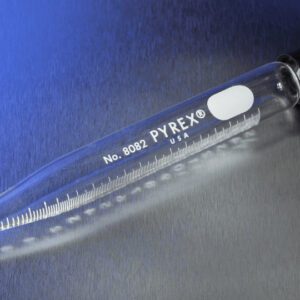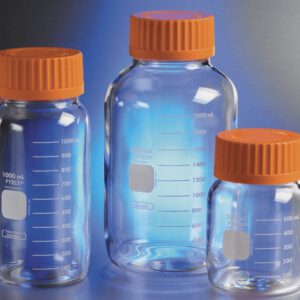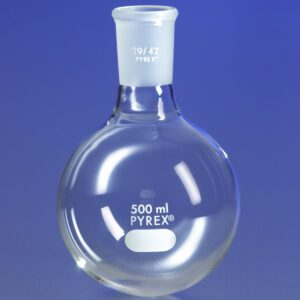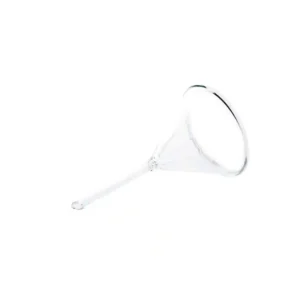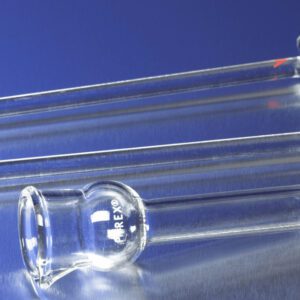PYREX® 50 mL Conical Centrifuge Tubes with White Graduations, Screw Cap
د.إ 1,508.10
Available on backorder
These 50 mL PYREX® conical centrifuge tubes have white enamel graduations for durability. The 15 mL size is graduated upward from the tip in 0.1…
PYREX® 50 mL Round Bottom Centrifuge Tube with Standard Taper Pennyhead Stopper 12 / Cs
د.إ 3,190.00
Available on backorder
These 50 mL PYREX® round bottom, nongraduated centrifuge tubes have a No. 13 Standard Taper solid glass pennyhead stopper. Rockefeller Institute of Medical Research type.…
PYREX® 500 mL Kjeldahl Nitrogen Distilling Apparatus, Standard Taper Joints
د.إ 2,427.10
In stock, 1 unit
This PYREX® 500 mL distilling apparatus is used for determining nitrogen in organic compounds. This assembly includes a Kjeldahl flask specifically developed for this process…
PYREX® 500 mL Kuderna-Danish Concentrator Apparatus without Hooks
د.إ 1,787.10
In stock, 4 units
These 500 mL PYREX® Kuderna Danish Concentrators are supplied with Keck clamps instead of spring hooks. The complete apparatus consists of a 3-Ball Snyder column…
PYREX® 500 mL Round Wide Mouth Media Storage Bottles, with GLS80 Screw Cap
د.إ 871.10
Available on backorder
These PYREX® wide mouth bottles are designed for heavy duty storage as well as mixing and sampling. The extra wide mouth (69mm inner diameter) gives…
PYREX® 500 mL Short Neck Boiling Flask, Round Bottom, 29/42 Standard Taper Joint
د.إ 335.00
In stock, 1 unit
Qty./Pk 1 / Pk Qty./Cs 1 / Cs Brand PYREX® Capacity 500 mL Flask Shape Round bottom Top Style Standard Taper Joint Neck Style Short…
PYREX® 65 mm Diameter 50° Angle Fluted Funnel, Short Stem
د.إ 3,339.10
Available on backorder
Useful in clinical and hospital labs; can be used in flasks or tubes without racks These 65mm diameter PYREX® fluted funnels have a strong beaded…
PYREX® 65 mm Diameter 60° Angle Fluted Funnel, Short Stem
د.إ 3,186.10
Available on backorder
Useful in clinical and hospital labs; can be used in flasks or tubes without racks These 65mm diameter PYREX® fluted funnels have a strong beaded…
PYREX® 65 mm Diameter 75° Angle Fluted Funnel, Short Stem
د.إ 3,174.10
Available on backorder
Useful in clinical and hospital labs; can be used in flasks or tubes without racks These 65mm diameter PYREX® fluted funnels have a strong beaded…
PYREX® 7 mL Dounce Tissue Grinder with two Pestles
د.إ 963.00
Available on backorder
PYREX® 7 mL Dounce Tissue Grinder,these hand-driven 7 mL PYREX®; tissue grinders are supplied with two pestles to ensure dissociation of cells into fine particles…
PYREX® 9 Depression Glass Spot Plates
د.إ 4,501.10
Available on backorder
These pressed PYREX® glass plates have 9 concave depressions (22mm O.D. x 7mm deep) which are useful for soil chemistry, color reactions, microchemical applications and…
PYREX® 9 mL Screw Cap Culture Tubes with PTFE Lined Phenolic Caps, 13×100 mm
د.إ 2,459.10
Available on backorder
PYREX® culture tubes are supplied with deep-form 13-415 GPI threaded phenolic caps to facilitate handling and sealing after autoclaving. Caps are fabricated from a special…

